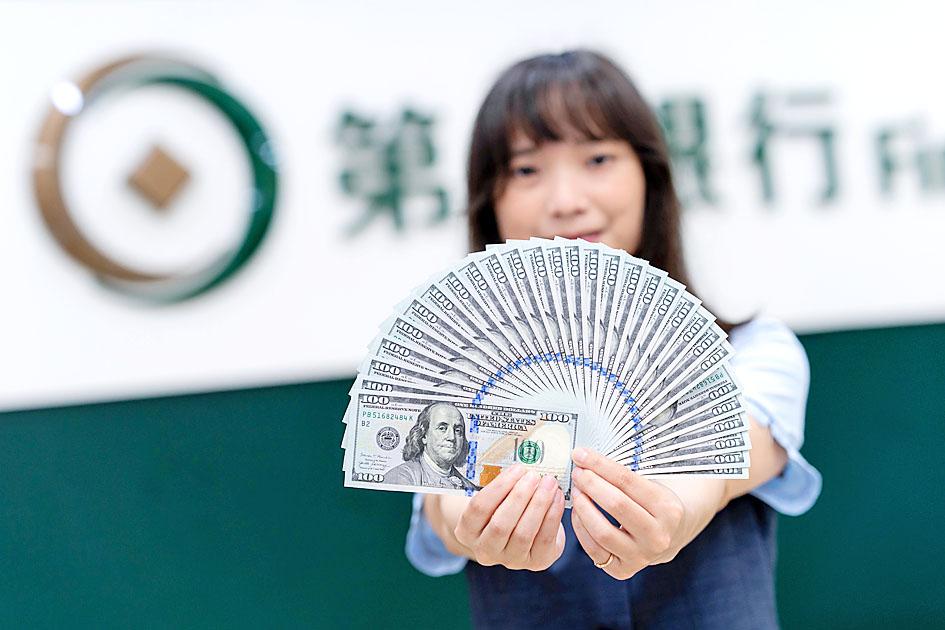Interest rates for new loans at the nation’s five major state-run banks last month rose 0.014 percentage points to 1.435 percent on average, as lenders raised borrowing costs for mortgages, consumer loans and corporate loans to boost working capital, the central bank said yesterday.
The adjustments came as Bank of Taiwan (臺灣銀行), Land Bank of Taiwan (土地銀行), Taiwan Cooperative Bank (合作金庫銀行), Hua Nan Commercial Bank (華南銀行) and First Commercial Bank (第一銀行) on Monday raised their interest rates after the central bank last week increased its discount rate from 1.375 percent to 1.5 percent to tame inflation.
PRE-COVID-19 LEVELS

Photo: Chen Mei-ying, Taipei Times
“Following the latest adjustments, interest rates for almost all banking operations returned to the level prior to the COVID-19 pandemic in March 2020,” when the monetary policymaker cut the discount rate by 0.25 percentage points to a historic low of 1.125 percent to ease the financial burden of borrowers, the central bank said in a statement.
New mortgages last month carried an annual interest rate of 1.601 percent, gaining 0.4 percentage points from April, the central bank said, as some lenders adjusted rates on a quarterly basis.
The rate would climb higher this month after the central bank introduced another rate increase of 0.125 percentage points on Friday last week and could tighten further if inflationary pressures fail to ease off.
Interest rates for corporate loans to boost working capital edged up 0.042 percentage points to 1.387 percent on average last month, while interest rates for consumer loans rose 0.1 percentage points to 2.356 percent on average, the central bank said.
GOVERNMENT LOANS
Interest rates for capital spending declined 0.248 percentage points to 1.558 percent on average for the five major banks, dragged by loans taken out by government agencies, the central bank said.
Government agencies enjoy lower borrowing costs due to their strong credit standing.

MULTIFACETED: A task force has analyzed possible scenarios and created responses to assist domestic industries in dealing with US tariffs, the economics minister said The Executive Yuan is tomorrow to announce countermeasures to US President Donald Trump’s planned reciprocal tariffs, although the details of the plan would not be made public until Monday next week, Minister of Economic Affairs J.W. Kuo (郭智輝) said yesterday. The Cabinet established an economic and trade task force in November last year to deal with US trade and tariff related issues, Kuo told reporters outside the legislature in Taipei. The task force has been analyzing and evaluating all kinds of scenarios to identify suitable responses and determine how best to assist domestic industries in managing the effects of Trump’s tariffs, he

TIGHT-LIPPED: UMC said it had no merger plans at the moment, after Nikkei Asia reported that the firm and GlobalFoundries were considering restarting merger talks United Microelectronics Corp (UMC, 聯電), the world’s No. 4 contract chipmaker, yesterday launched a new US$5 billion 12-inch chip factory in Singapore as part of its latest effort to diversify its manufacturing footprint amid growing geopolitical risks. The new factory, adjacent to UMC’s existing Singapore fab in the Pasir Res Wafer Fab Park, is scheduled to enter volume production next year, utilizing mature 22-nanometer and 28-nanometer process technologies, UMC said in a statement. The company plans to invest US$5 billion during the first phase of the new fab, which would have an installed capacity of 30,000 12-inch wafers per month, it said. The

‘SWASTICAR’: Tesla CEO Elon Musk’s close association with Donald Trump has prompted opponents to brand him a ‘Nazi’ and resulted in a dramatic drop in sales Demonstrators descended on Tesla Inc dealerships across the US, and in Europe and Canada on Saturday to protest company chief Elon Musk, who has amassed extraordinary power as a top adviser to US President Donald Trump. Waving signs with messages such as “Musk is stealing our money” and “Reclaim our country,” the protests largely took place peacefully following fiery episodes of vandalism on Tesla vehicles, dealerships and other facilities in recent weeks that US officials have denounced as terrorism. Hundreds rallied on Saturday outside the Tesla dealership in Manhattan. Some blasted Musk, the world’s richest man, while others demanded the shuttering of his

Taiwan’s official purchasing managers’ index (PMI) last month rose 0.2 percentage points to 54.2, in a second consecutive month of expansion, thanks to front-loading demand intended to avoid potential US tariff hikes, the Chung-Hua Institution for Economic Research (CIER, 中華經濟研究院) said yesterday. While short-term demand appeared robust, uncertainties rose due to US President Donald Trump’s unpredictable trade policy, CIER president Lien Hsien-ming (連賢明) told a news conference in Taipei. Taiwan’s economy this year would be characterized by high-level fluctuations and the volatility would be wilder than most expect, Lien said Demand for electronics, particularly semiconductors, continues to benefit from US technology giants’ effort